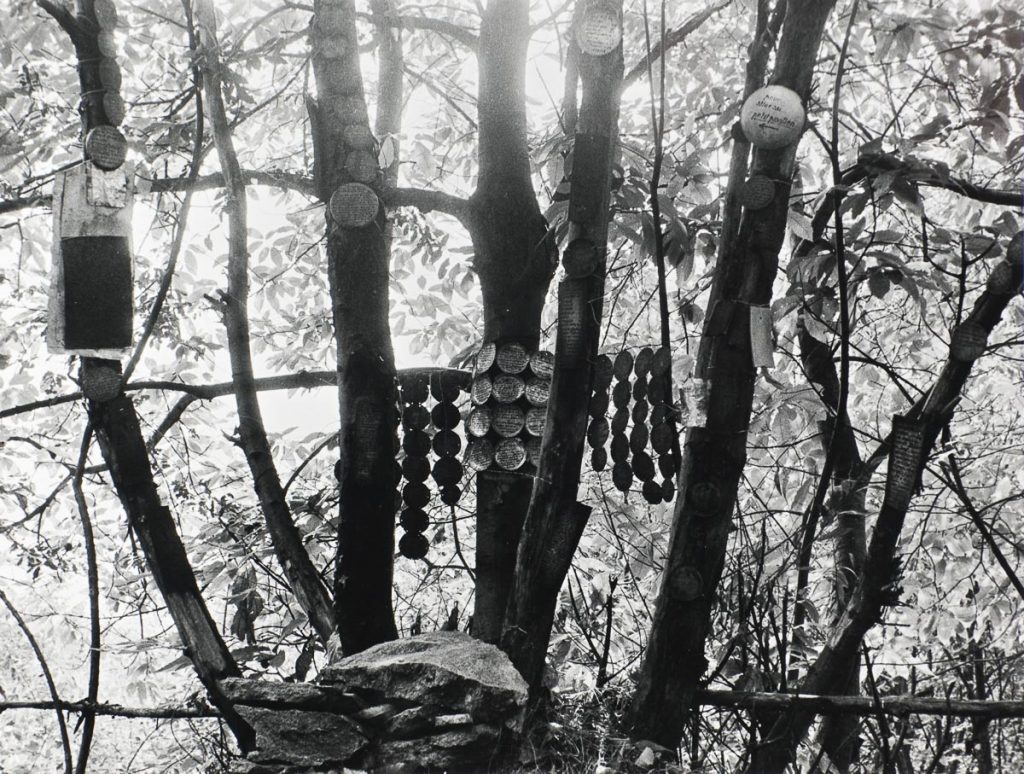
A seventy-year old man is living in Switzerland – in the midst of a huge forest of chestnut trees. His initials are A. S. He hides from visitors. He has not spoken with anyone for years. Since 1951 he has been working on assembling pieces of information, writing them on panels, then attaching them to the trees of his woods, arranged in an encyclopedic order.
A. S. has never thought of himself as an artist. He doesn’t that there may be movements in art which might resemble the things he does. He says that he knows that people think of him as crazy and that they are laughing about him. He does not seem to mind. He used to be a bank employee, then he ran three fashion boutiques all at one time, and finally he held a post in the ministry of the Swiss capital, Berne – all until twenty years ago when he began changing his large woods.
It’s a steep slope. There are no paths. He falls. His head is bleading often. His body is protected by rags, held together by strings and safety-pins. He once said: „A while ago I used to have three bath tubs, two boilers, two ice boxes … but one needs none of these things, nothing … not even a W. C. At another time he said: „You do your reading differently from the way I read. When you read you do it to stimulate your emotion or mind. But when I read something I read for the sake of finding order.“
Ingeborg Lüscher 1972
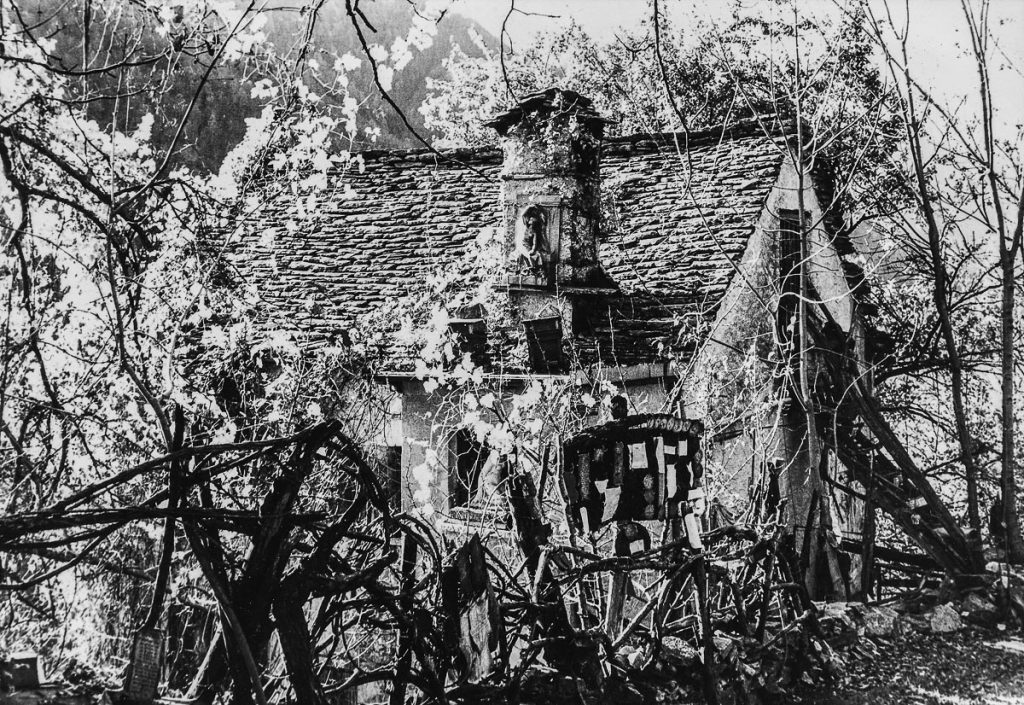
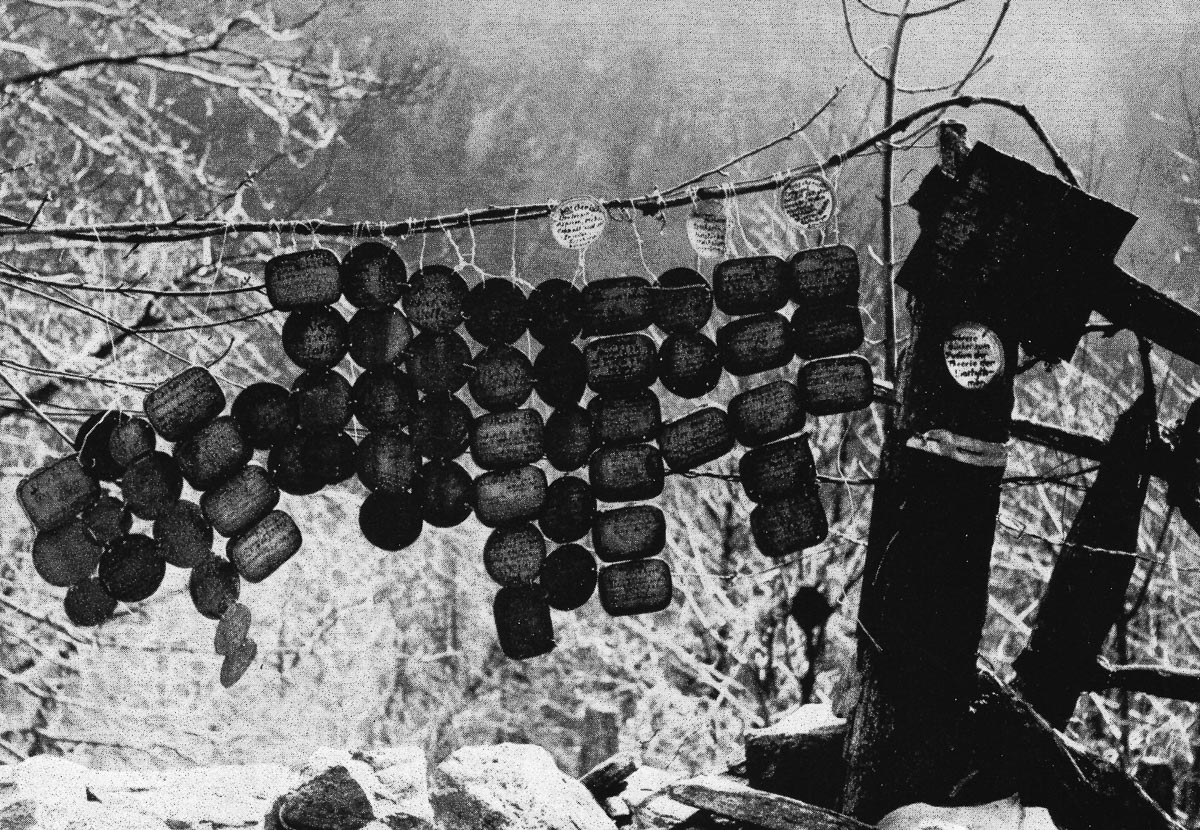
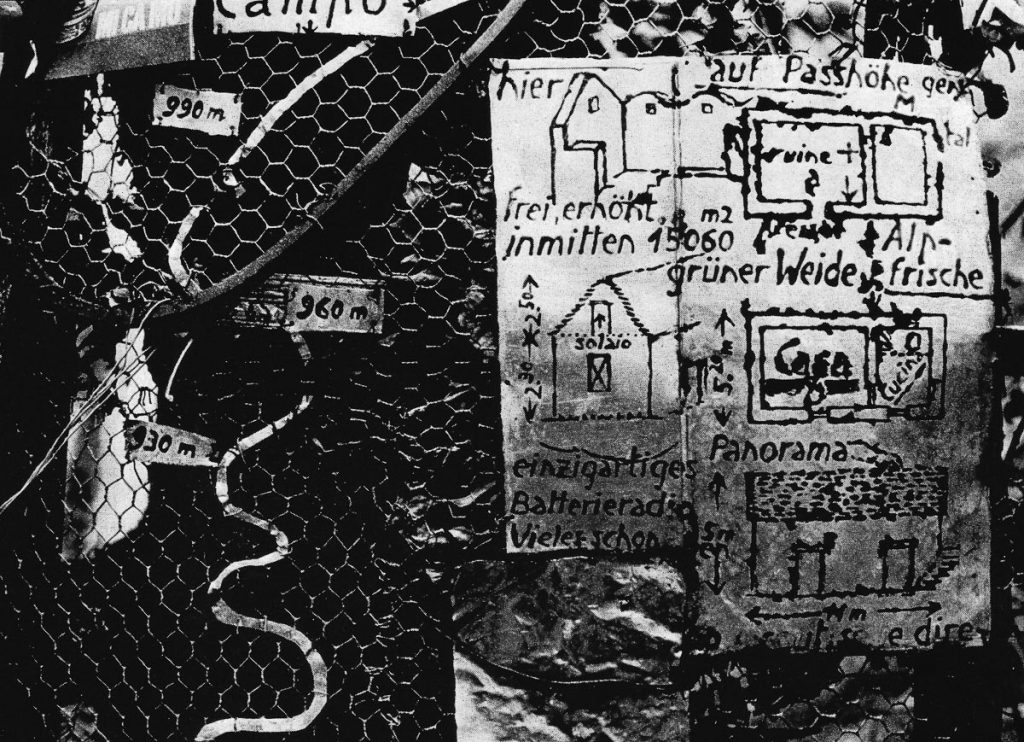
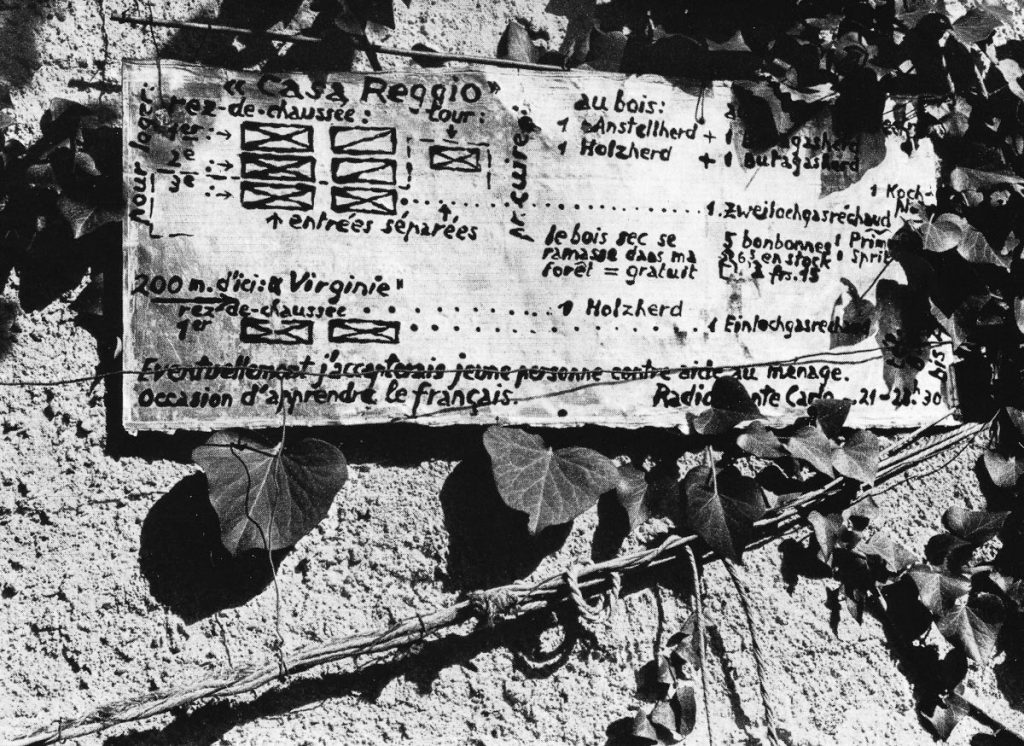
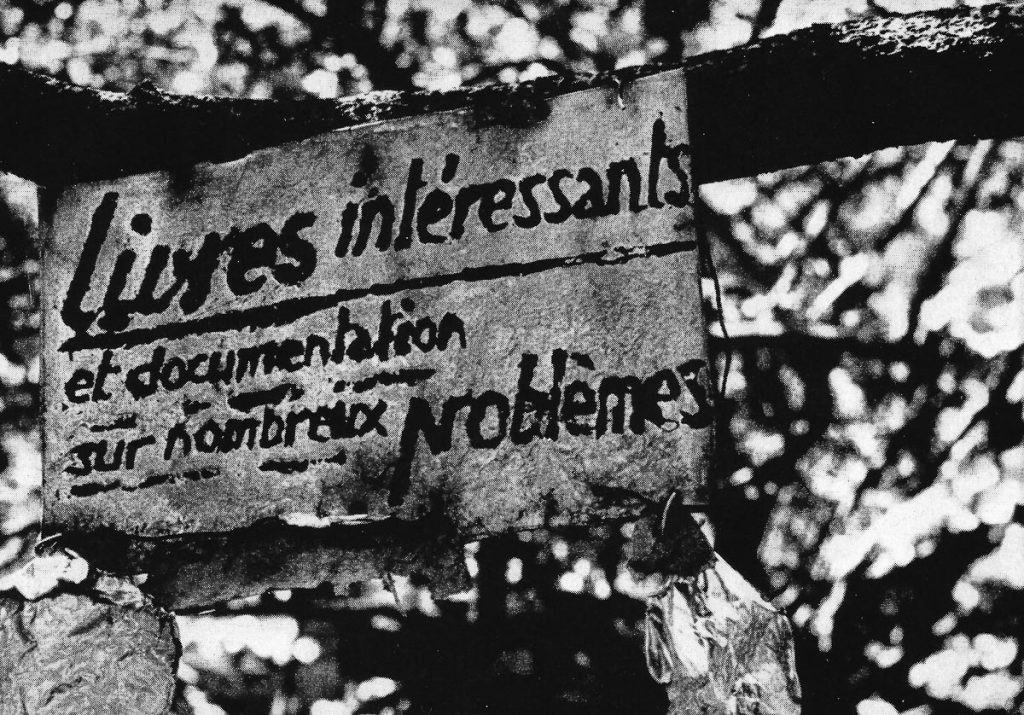
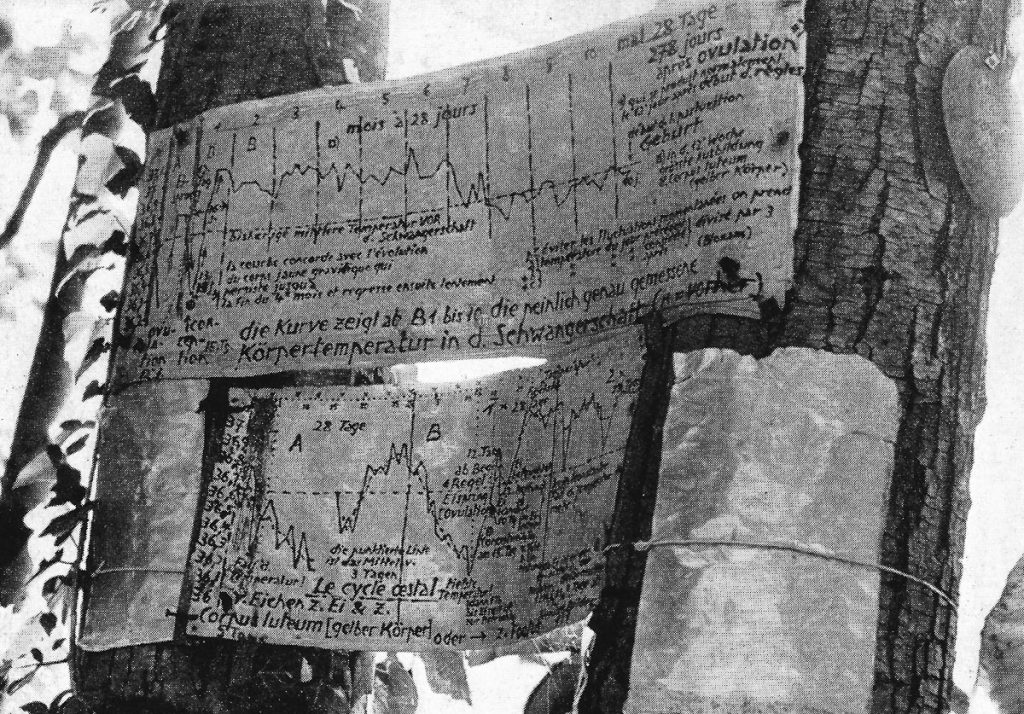
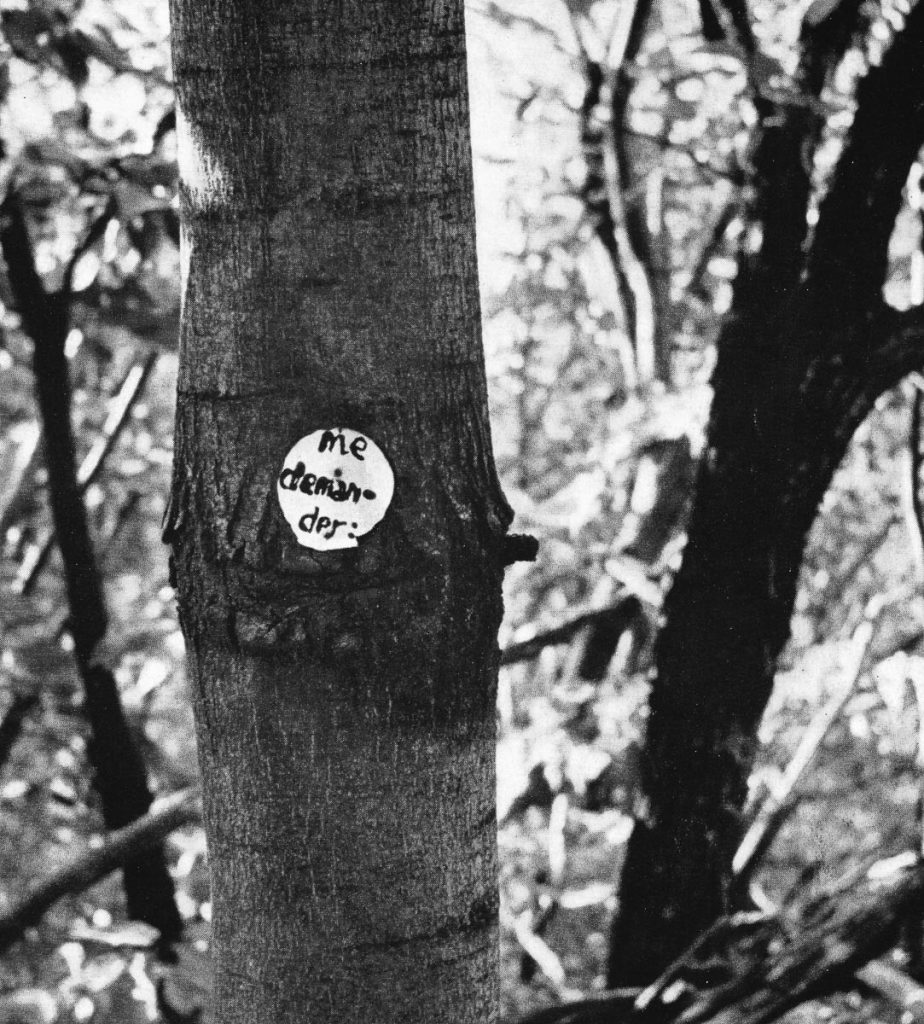
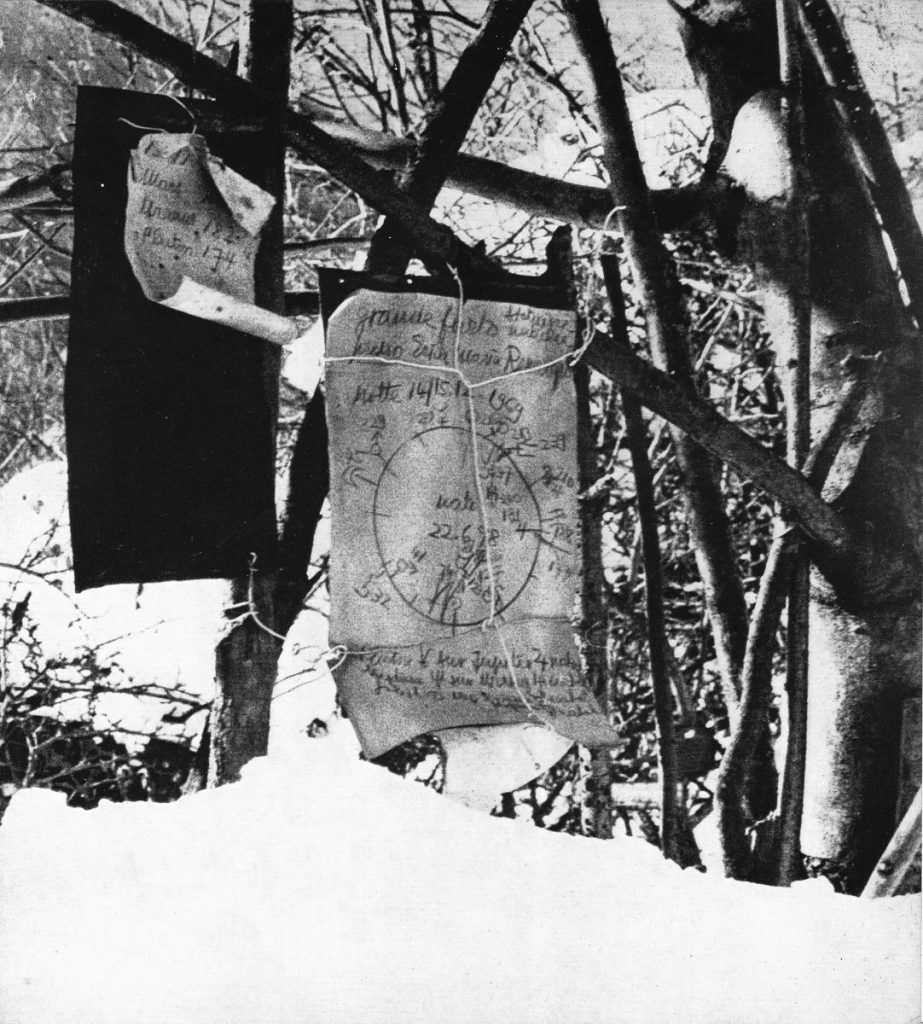
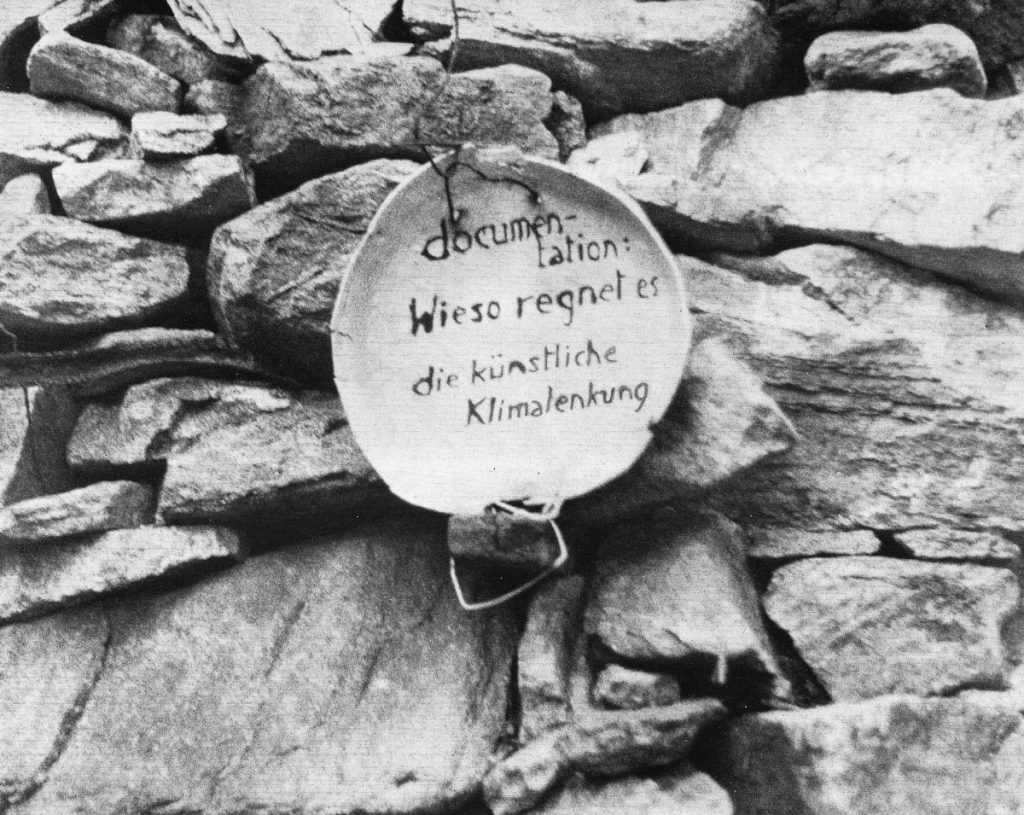
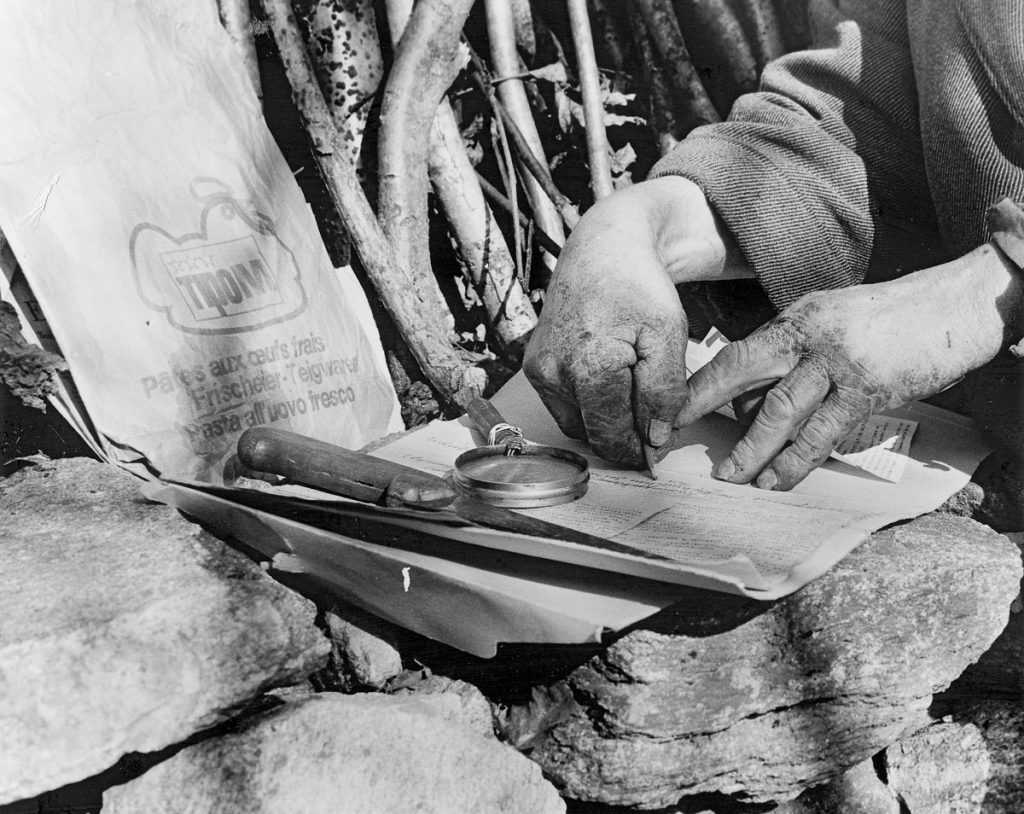
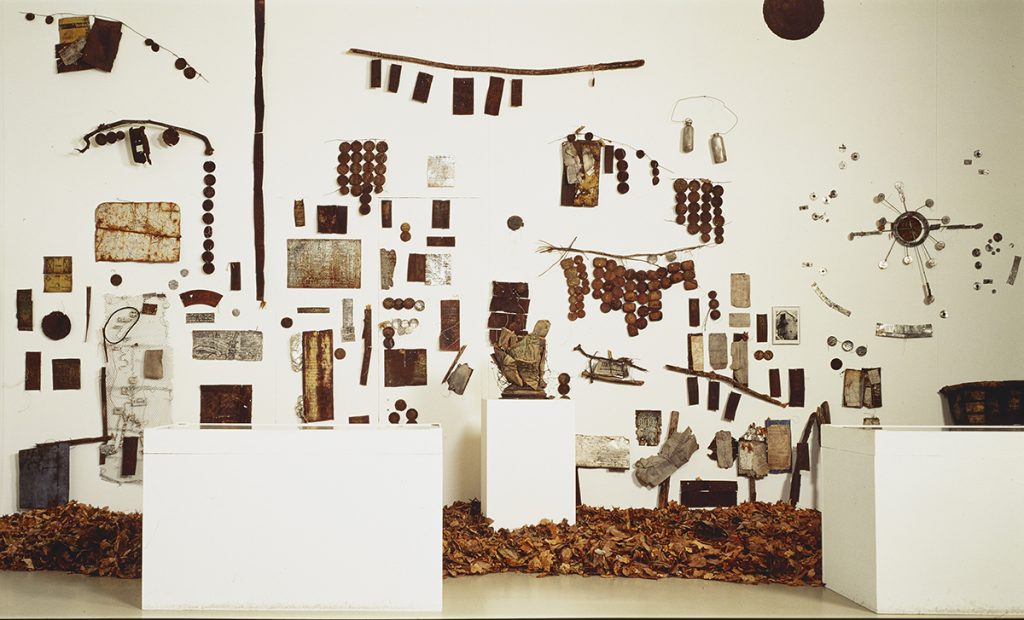
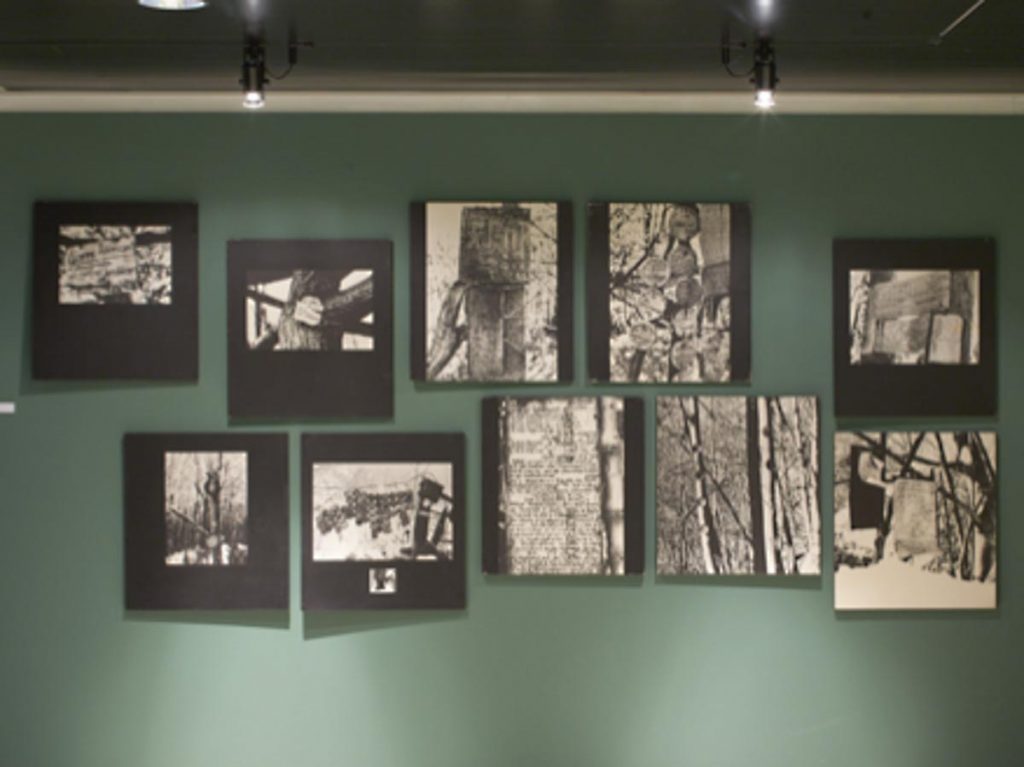
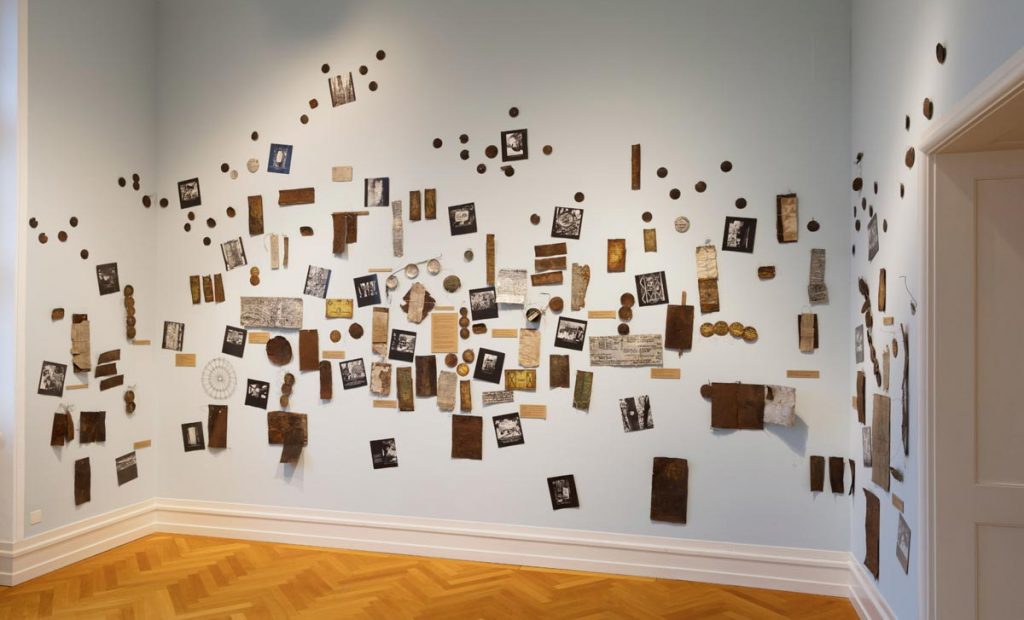
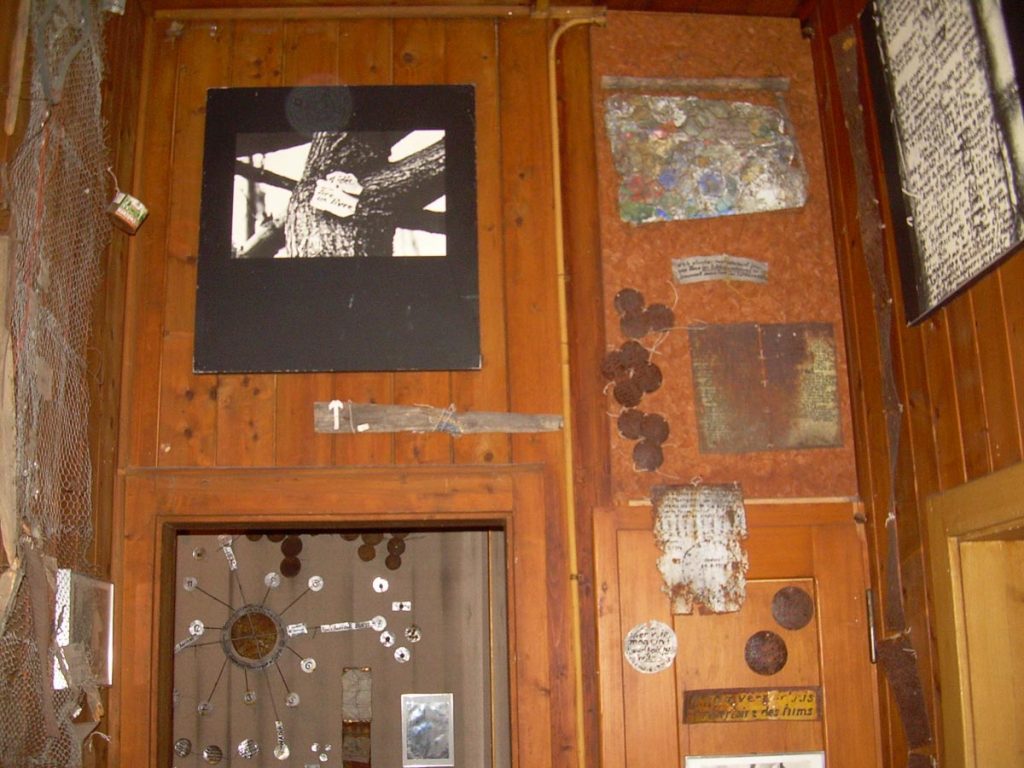
Installation views:
Kunsthaus Zürich 1992 (above)
Centre Dürrenmatt, Neuchâtel 2014 (below)
Installation views:
Kunsthalle Bern 2018 (above)
Casa Anatta, Ascona 1981 (below)
IL279.001 – IL279.169
Documentation about A. S., 1972
Dokumentation über A. S., 1972
Series of 169 b/w photographs, taken in the forest of Armand Schulthess, Onsernone valley (Ticino), different dimensions
The numbering of the photographs follows their reproduction in the artist book „Dokumentation über A.S.“
The numbers of the here reproduced photopgraphs are
IL279.002
IL279.005 IL279.049
IL279.030 IL279.057
IL279.054 IL279.089
IL279.001 IL279.107
IL279.031 IL279.067
Since 1972, various selections of the series have been reproduced in different dimensions and have been on view in numerous exhibitions.
For documenta 5 in Kassel 1972, for group exhibitions in Berlin and Leverkusen,, for solo exhibitions in Wiesbaden, Aarau, The Hague, Chemnitz, Rovereto and Solothurn and for the travelling exhibition „Harald Szeemann. Museum of obsessions“, Ingeborg Lüscher realized different room installations about A.S., which are separately documented. See installations no 279.1, 279.2, 279.3, 279.4 and 279.5.
Additionally, in 1978, 1981, 1983, 1992 and 2004 selections of the photo series were displayed by Harald Szeemann as part of his Armand Schulthess installations in the exhibitions „Le mammelle della verità. Die Brüste der Wahrheit“, „Der Hang zum Gesamtkunstwerk“, „Suiza Visionaria. Visionäre Schweiz“ and „The Beauty of Failure. The Failure of Beauty“. Since 1981, a selection of 16 photographs is part of the permanent exhibition „Monte Verità“at Casa Anatta, Ascona (reopened 2017 after four years of restauration).
Between 2013 and 2016, other selections of the series have been displayed in the exhibitions „Armand Schulthess. Il giardino della conoscenza“ in Sospiro „Le labyrinthe poétique de Armand Schulthess“ in Neuchâtel and „Armand Schulthess domaine no 1“ in Lugano.
In 2018 and 2019, Ingeborg Lüscher was invited to install the Armand Schulthess installations of the exhibition „Harald Szeemann. Museum of Obsessions“ at Getty Research Institute Los Angeles (travelling to Kunsthalle Bern, Kunstverein Düsseldorf and Castello di Rivoli Torino).
The Artist book „Der größte
Vogel kann nicht fliegen. Ingeborg Lüscher, Dokumentation über A. S.“ was published 1972 and exhibited
in Malmö in 1978.
Exhibitions
Neue Galerie (documenta 5), Kassel 1972
Akademie der Künste, Berlin 1972 (Erholungshaus der Bayer AG Leverkusen 1972)
Schaubühne am Halleschen Ufer, Berlin 1977
Konsthall Malmö 1978
Isola di Brissago/Ascona 1978 (Kunsthaus Zürich 1978-1979. Akademie der Künste, Berlin 1979. Museum des 20. Jahrhunderts, Wien 1979)
Museo Casa Anatta, Ascona 1981
Kunsthaus Zürich 1983 (Kunstmuseum Wien 1983. Kunstverein Düsseldorf 1983. Schloss Charlottenburg, Berlin 1984)
Museo Reina Sofia, Madrid 1992 (Kunsthaus Zürich 1992. Kunstverein Düsseldorf 1992)
Museum Wiesbaden 1993
Aargauer Kunsthaus Aarau 1996
Museo Onsernone, Locarno 1997
Stroom Center for the Visual Arts, Den Haag 2000
Kunstsammlungen Chemnitz 2001-2002
MART Rovereto 2004
Museu d’Art Contemporani de Barcelona 2004
MAI Museo Arte Irregolare, Sospiro 2013
Centre Dürrenmatt, Neuchâtel 2014
Museo d’Arte della Svizzera italiana, Lugano 2016
Kunstmuseum Solothurn 2016
Museo Casa Anatta, Ascona 2017
Getty Research Institute Los Angeles 2018 (Kunstmuseum Bern 2018. Kunsthalle Düsseldorf 2018. Castello di Rivoli, Torino 2019)
Kunstmuseum Bochum 2022
Catalogues
Kassel 1972 (ill, unpaged). Berlin 1972, pp 195-201 (ill). Berlin 1977, p 35 (ill). Malmö 1978, pp 166-167 (ill). Ascona 1978, pp 166-167 (ill). Zürich 1983, pp 405-408 (ill). Zürich 1992, p 215. Wiesbaden 1993, pp 17-21 (ill), p 94. Aarau 1996, pp 20-21 (ill). Den Haag 2000 (ill). Chemnitz 2002, pp 34-37 (ill). Rovereto 2004, pp 42-47 (ill). Barcelona 2004. Zürich/New York 2007, pp 410 (ill), 411 (ill). Sospiro 2013 (ill). Neuchâtel 2014 (ill). Lugano 2016 (ill). Solothurn 2016, pp 38-45 (ill). Los Angeles 2018, pp 178 (ill), 236 (ill), 237 (ill). Bern/Düsseldorf 2018, pp 178 (ill), 236 (ill), 237 (ill). Rivoli-Torino 2019, pp 40-66 (ill). Hadersdorf am Kamp 2021, pp 4-5 und 12-14 (ill).
Texts
Curiger 1972, p 21 (ill). Hartung 1972. Michaelis 1972. Ohff 1972 (ill). Schauer 1972. Schaumann 1972. Schmid 1972, p 29 (ill). Schmidt 1972, p III. Widmer 1972. Marchese 1973. Weder 1973. Höllerer 1974, pp 31-38. Altmann 1978, p 156. Kneubühler 1978, p 72 (ill). Kneubühler 1979, p 69. Rattemeyer 1993, p 36. Lüscher/Resseler 1996, pp 106-109. Herzog 1999, pp 20-21 (ill). Tienhoven 2000 (ill). Graevenitz 2001, p 12, p 16. Herzog 2002, p 20, p 24. Schlaegel 2010, pp 50-53 (ill). Müller 2016, p 156, p 163. Vögele 2016, p 16, p 30. Staufer 2017, p 13. Tessiner Zeitung Extra, Herbst 2017, p 27 (ill). Ebenbeck 2018, pp 16-17 (ill). Christov-Bakargiev 2018, pp 201-217 (ill). Christov-Bakargiev 2019, pp 40-66 (ill)
Note
See Neue Zürcher Zeitung, 17 October 1997 about the tour of the play „Meine erste Frau hieß Zwieback“ in Hamburg and Zürich.